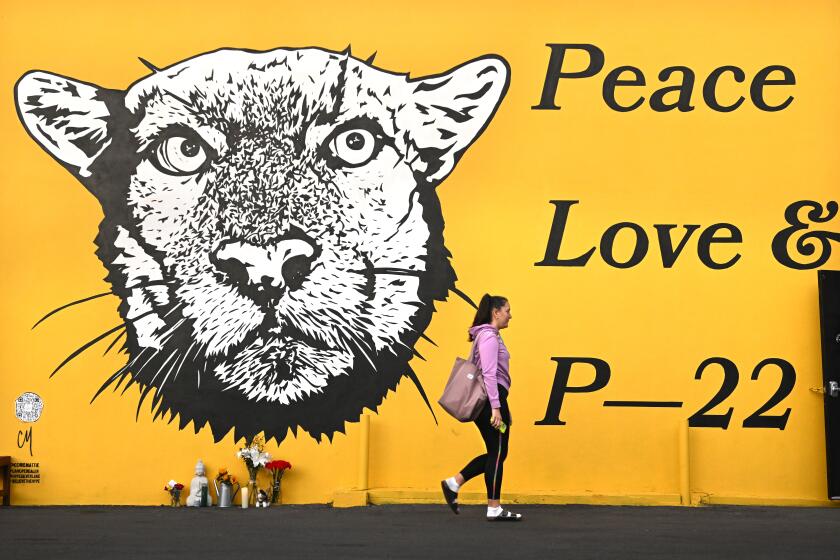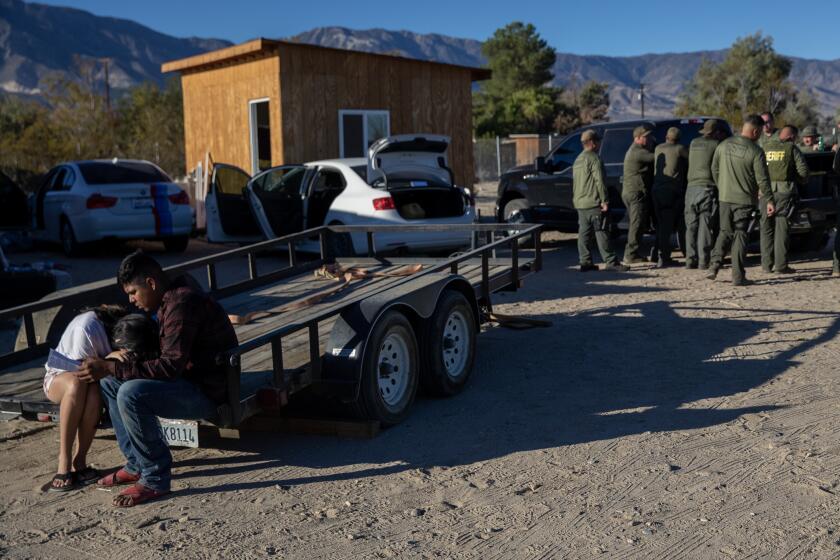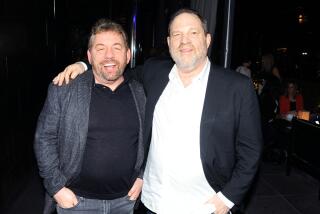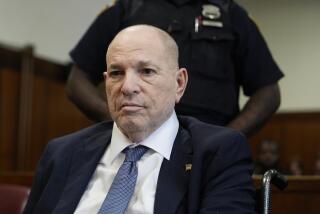Harvey Weinstein convicted of rape in Los Angeles
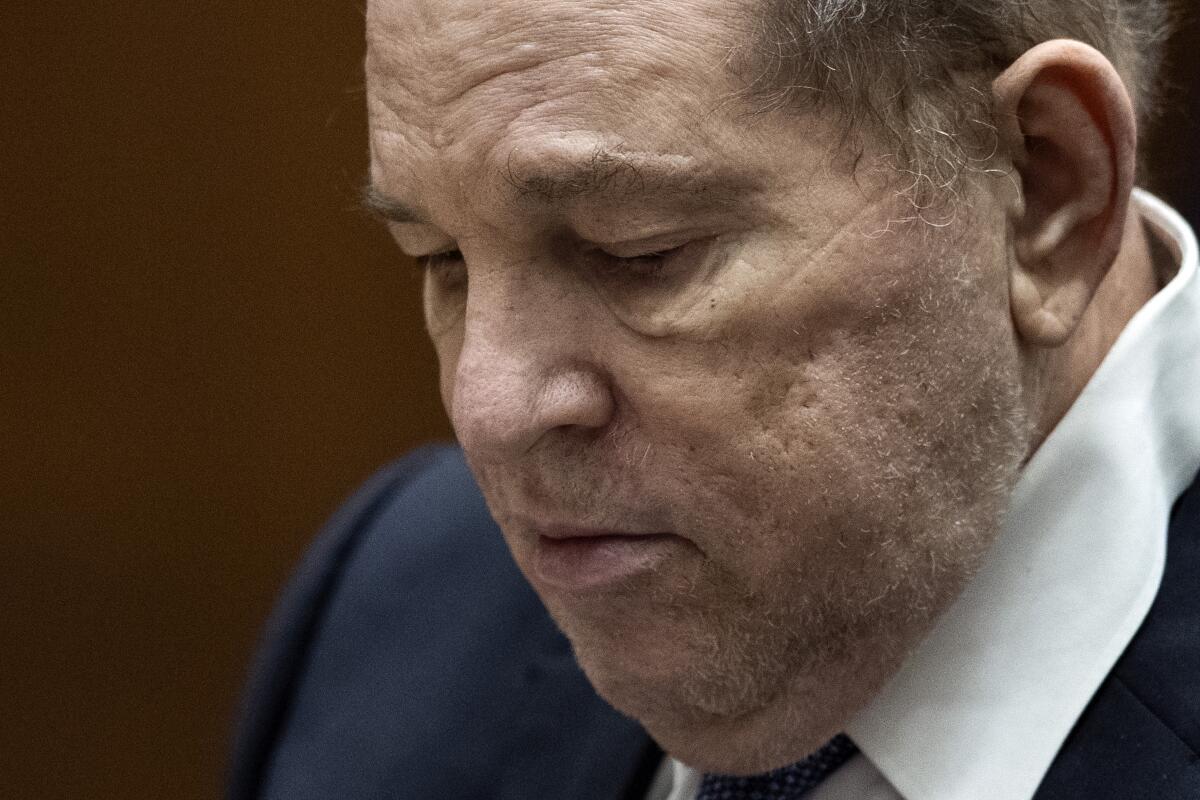
- Share via
A Los Angeles jury on Monday found Harvey Weinstein guilty of rape, delivering a verdict that further condemns the disgraced movie titan whose treatment of women helped spur the #MeToo movement.
The decision all but assures that Weinstein, who is 70, in poor health and serving a 23-year prison sentence in New York for other rapes, will spend the rest of his life behind bars. He is scheduled to be sentenced in the Los Angeles case early next year but must complete his current prison sentence before being transferred to California.
Following a bitter trial that stretched over a month, jurors deliberated for more than nine days before returning to convict Weinstein of forcible rape, forcible oral copulation and sexual penetration by a foreign object. The charges were based on the account of a woman who accused Weinstein of attacking her in a Beverly Hills hotel room in 2013.
“Harvey Weinstein forever destroyed a part of me that night. I will never get that back,” the woman said in a statement. “But I knew I had to see this through to the end ... I hope Weinstein never sees the outside of a prison cell during his lifetime.”
Weinstein showed little emotion as the verdicts were read in a downtown courtroom, pressing his hands to his head. He did not testify at either of his trials. On Monday, his defense attorneys declined to comment outside the courtroom.
The jury either acquitted Weinstein or could not reach a verdict on charges he raped or assaulted three other women in Beverly Hills hotel rooms between 2004 and 2013. Los Angeles County Superior Court Judge Lisa Lench declared a mistrial on the charges over which the jury was deadlocked.
Los Angeles County Dist. Atty. George Gascón said a decision has not been made about whether to retry Weinstein on the charges over which the jury deadlocked.
“I want to thank the survivors in this case, who exhibited extraordinary bravery in a case that put them in the national spotlight. Reporting sexual assault is never easy. Subjecting oneself to at times brutal cross-examination can be re-traumatizing and extraordinarily painful,” he said.
For now, Weinstein faces up to 18 years in prison. At a hearing on Tuesday, however, prosecutors will argue to jurors that they should find aggravating factors were at play in the crimes. If the panel does so, Weinstein could be sentenced to up to 24 years behind bars.
Weinstein’s legal troubles in L.A. began on the eve of his Manhattan trial in January 2020, when prosecutors here brought an initial set of charges against him based on the claims of two women. More charges would follow.
It was one of those first accusers, an Italian model identified in court as Jane Doe 1, on whose allegations the jury convicted Weinstein. Weinstein, she said, had barged into her room at the Beverly Hills hotel she was staying in while attending a film festival to brutally assault her.
In a 2017 interview with The Times, the woman said she and Weinstein had spoken briefly earlier in the evening at the Los Angeles Italia Film, Fashion and Art Fest. Later, she said, he showed up “without warning” in the lobby of her hotel — which surprised her because she didn’t tell him where she was staying. She said she refused his entreaties to go up to her room with her and left him in the lobby, but that he soon was knocking on her door.
“He ... bullied his way into my hotel room, saying, ‘I’m not going to [have sex with] you, I just want to talk,’” the woman told The Times. She said Weinstein soon turned aggressive, bragging about his power and influence.
“He grabbed me by the hair and forced me to do something I did not want to do,” she said. “He then dragged me to the bathroom and forcibly raped me.”
The woman reported the attack to Los Angeles police in October 2017, not long after articles in the New York Times and the New Yorker detailed sexual misconduct allegations against Weinstein that helped spark the #MeToo movement and ended the career of one of Hollywood’s most powerful figures.
The second woman, Lauren Young, accused Weinstein of luring her to a hotel suite with an offer to discuss a screenplay she’d written and then groping her in a bathroom while he masturbated. Young first detailed her alleged assault during the New York trial, where she was among several women who testified about “prior bad acts” by Weinstein that were not part of the charges against him.
On Monday, jurors told Lench that they were deadlocked on the sexual battery charge based on Young’s accusation because two jurors would not vote to convict Weinstein.
More than 100 women have accused Weinstein of sexual misconduct since 2017. The Miramax co-founder, who was once celebrated as the force behind many iconic films including “Pulp Fiction,” “Good Will Hunting” and “The English Patient,” has now been erased from the film industry’s collective memory. The studio that bore his name is gone and the awe he once instilled has been replaced by disgust.
Following the initial charges, Weinstein was indicted last year on several additional counts of sexual assault. Among that new group of accusers was Jennifer Siebel Newsom, now Gov. Gavin Newsom’s wife, who alleged that Weinstein raped her during a meeting that was supposed to be about her nascent acting career. The jury could not reach a verdict on the charges stemming from Siebel Newsom’s allegations with eight in favor of convicting Weinstein and four opposed.
During two days of emotional testimony last month, Siebel Newsom said a group of Weinstein’s aides left her alone with Weinstein in a hotel suite. They discussed foreign film projects, but he seemed uninterested and retreated to a bathroom, she recalled. He emerged in a robe and started masturbating, she testified. For the next 45 minutes, she said, Weinstein repeatedly tried to coerce her into sex, claiming a number of other A-list actresses had slept with him to advance in Hollywood.
“I’m shaking. I’m crying. He knows this is not consent at all,” she testified.
After Monday’s verdict, Siebel Newsom said the former Hollywood kingmaker would “never be able to rape another woman.”
“Throughout the trial, Weinstein’s lawyers used sexism, misogyny, and bullying tactics to intimidate, demean, and ridicule us survivors,” said Siebel Newsom, who was referred to as a “bimbo” by one of Weinstein’s lawyers in his opening statement. “This trial was a stark reminder that we as a society have work to do.”
In her closing argument, Deputy Dist. Atty. Marlene Martinez told jurors the attack on Siebel Newsom was one of several that showed Weinstein had a predatory method. He used the promise of career advancement to get women alone, and after an assault would arrange more meetings with the women or offer them film roles, Martinez said. The follow-up meetings or offers, she argued, were done to guard against rape accusations by making it appear the women willingly traded sex for professional help.
“For this predator, hotels were his trap,” Martinez said. “Confined within those walls, victims were not able to run from his hulking mass. People were not able to hear their screams.”
Weinstein has denied all wrongdoing. His defense attorneys, Mark Werksman and Alan Jackson, argued the assaults alleged by Jane Doe 1 and Young never happened. The attorneys acknowledged Weinstein had sexual relationships with Siebel Newsom and Juls Bindi — a masseuse who alleged that Weinstein groped her and masturbated in front of her in 2010 — but Werksman described their interactions as “transactional.”
Bindi, they said, was offered a book deal by Miramax’s publishing arm after their encounter. Siebel Newsom stayed in touch with Weinstein about future film projects and later solicited Weinstein, a high-level donor to Democrats, for contributions to her husband’s campaigns. The jury Monday cleared Weinstein of the charge related to Bindi.
The defense attorneys also argued that many of the women had been opportunists, taking advantage of the wave of anger toward powerful, abusive men that fueled the #MeToo movement to rewrite what had been consensual “casting couch” relationships as rape.
L.A. Reads
L.A. Guides
Jackson said the prosecution’s case was built off emotion rather than fact. No witnesses could corroborate the assaults, he said. And while the allegations against Weinstein may have helped make the phrase #MeToo ubiquitous, Jackson reminded jurors that social movements were not evidence.
“I don’t know how to say it more gentle than this, but fury does not make fact,” he said. “Tears do not make truth.”
Gloria Allred, the well-known women’s rights attorney who represented Young in the Los Angeles case, said “justice was won” on Monday and noted the results could prove critical if Weinstein wins an appeal of his New York conviction next year.
“Even if the New York conviction remains intact, the women whom Harvey Weinstein victimized in Southern California deserved to have their day in court,” she said.
More to Read
Sign up for Essential California
The most important California stories and recommendations in your inbox every morning.
You may occasionally receive promotional content from the Los Angeles Times.


